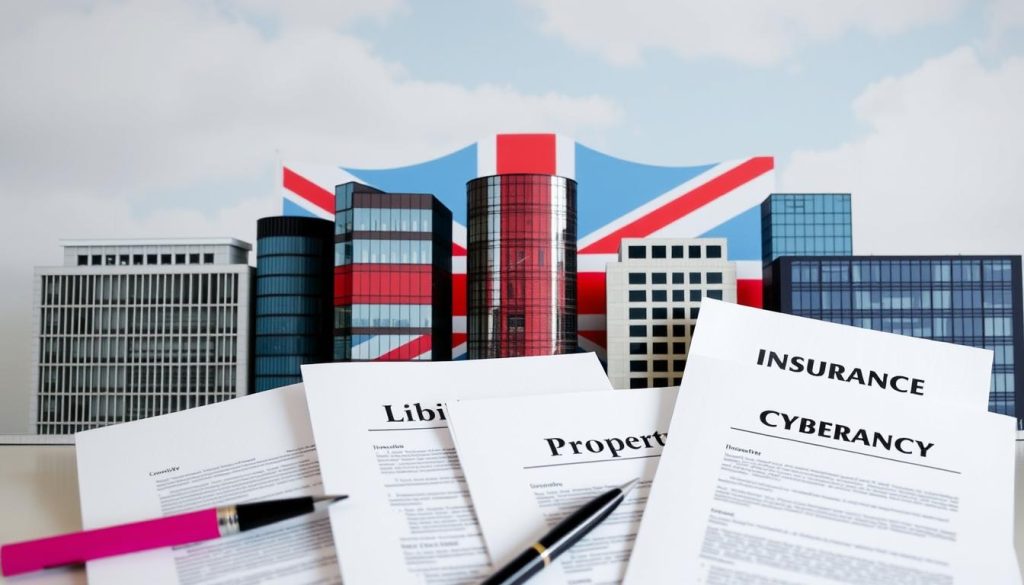Setting up a business in the United Kingdom is more than a great idea. You need to understand the local laws well. If you’re starting a new business or growing an existing one, you must learn about registration, taxes, employment laws, consumer rights, and being eco-friendly. This guide gives you all you need to know about these rules.
For deeper understanding, GOV.UK, the UK Companies House, and the British Chambers of Commerce are key. They provide lots of information and support. They make sure your business meets UK regulations.
Key Takeaways
- Understanding the UK regulatory framework is critical for a successful business establishment.
- Company registration with the UK Companies House is a fundamental step.
- Complying with tax obligations ensures smooth operation of your venture.
- Adhering to employment laws safeguards both employers and employees.
- Environmental compliance is crucial for sustainable business practices.
The Importance of Understanding Local Regulations
Understanding local regulations is key for regulatory compliance and a smooth business setup. They protect both business and public interests by setting standards to follow. Following these rules helps avoid legal risks and boosts operational performance.
Reports indicate ignoring rules can result in heavy fines and damage to reputation. Complying with these regulations also boosts the company’s standing. Whitepapers show that regulatory commitment attracts investors and builds customer trust. Moreover, it shows a company’s commitment to ethics, important in today’s market.
On the financial side, ignoring regulations can lead to penalties and lost opportunities. Knowing and adhering to legal requirements ensures business operations stay within the law. This avoids disputes and interruptions that can be expensive.
In conclusion, understanding local regulations is crucial for any company’s success. It protects the company and builds a trustworthy business environment.
Identifying Relevant Local Regulatory Bodies
Knowing which authorities regulate business operations is key. It affects your compliance and how efficiently you operate in the UK business regulation scene.
Government Agencies
In the UK, various government bodies ensure businesses follow the law. The Financial Conduct Authority (FCA) and the Health and Safety Executive (HSE) monitor different business activities.
- The Financial Conduct Authority (FCA) watches over the financial market. It ensures financial services are honest and clear.
- The Health and Safety Executive (HSE) looks after workplace health and safety. It demands businesses meet safety standards.
Industry-Specific Regulatory Bodies
Certain authorities specialise in specific industries. They set rules and standards relevant to their sector’s needs.
- The British Medical Association (BMA) controls the healthcare sector. It makes sure medical standards and ethics are followed.
- The British Retail Consortium (BRC) creates rules for retail. They focus on protecting and keeping consumers safe.
Getting to know these regulatory bodies and sector-specific authorities helps a lot. It makes navigating UK business regulation easier, helping your business stay compliant and succeed.
Steps to Register Your Business
Starting a new business in the UK means learning the steps and legal points of business registration UK. We will cover the key stages to follow, making sure you stick to local rules and make your business registration efficient.
Choosing the Correct Legal Structure
Choosing the legal structure is a crucial step in the UK business registration process. This choice affects your legal duties, taxes, and how your business runs. You can pick from:
- Sole Trader: Easy to manage but comes with unlimited liability.
- Partnership: Partners share responsibility and decisions, with various partnership types on offer.
- Limited Company: Offers limited liability and is seen as a separate entity.
Some businesses might look at other structures like Limited Liability Partnerships (LLPs) or Community Interest Companies (CICs). Each has unique advantages and rules.
Registering with Companies House
After choosing your business structure, the next step is to register with Companies House. This organisation is in charge of setting up and closing limited companies in the UK.
For a smooth registration, you need to prepare documents carefully. Companies House has guides to help. You’ll usually need:
- Name and address of the company.
- Details of directors and company secretary.
- Shareholders’ information (for limited companies).
- Memorandum and Articles of Association.
Seeking advice from business advisors can shed light on the different structures. Also, using legal templates and registration help can ease the paperwork.
Following these steps carefully, your business will meet UK rules. This sets a strong base for its success.
Essential Licenses and Permits
In the UK, every business must have the right licenses and permits. This ensures you’re following the law and avoiding legal problems. Whether it’s a general license or one specific to your industry, you need it to operate.
General Business Licences
Most UK businesses need general licences. Local councils list the permits you need and how to apply. For a retail store, you get a trading permit from the local council. You must submit some documents and pay a fee.
- Trading permit: Required for physical retail stores.
- Alcohol licence: Needed if you plan to sell alcohol.
- Food business registration: Mandatory for businesses handling food.
Check your local council’s website to see which licenses you need.
Industry-Specific Permits
Certain businesses also need specific permits. These ensure you meet special industry rules. Trade associations give advice on the permits needed.
- Health and Safety Permits: Crucial for making and building industries.
- Environmental Permits: Needed by waste-heavy industries.
- Professional Certification: Required in professions like healthcare and law.
Learning from businesses that got their licenses right can help. Getting advice from trade bodies or local councils is vital for your business.
Understanding Local Tax Obligations
When you own a business in the UK, knowing about taxes is crucial. You need to understand how to register for corporate tax and handle VAT. Staying on good terms with HM Revenue & Customs (HMRC) ensures your business runs smoothly.
Corporate Tax Registration
All businesses, big or small, must sign up for corporate tax with HMRC. This has to be done within three months of starting your business. If you don’t, you might face fines. Getting help from HMRC’s guides or an accountant can make this easier.
- Register your company online via the HMRC portal.
- Receive your Unique Taxpayer Reference (UTR) for corporate tax filing.
- Use the UTR for all corporate tax matters with HMRC.
VAT Duties
Businesses need to think about VAT registration too. If your sales go over the HMRC limit, you must register for VAT. This means adding VAT to your sales, submitting VAT returns regularly, and paying the VAT to HMRC. Keeping accurate records helps with following the rules.
- Apply for VAT registration through HMRC’s VAT Online Services.
- Submit your VAT returns online on time.
- Document all VAT transactions during the required period.
Following these steps for corporate tax and VAT helps keep your business in line with HMRC’s rules. Getting advice from financial experts can also help in planning your taxes better. This could improve how your business performs.
Labour Laws and Employment Regulations
Understanding employment law in the UK is vital for any business. This includes hiring new staff and keeping up with health and safety. These basics can really help your company succeed in the long run.
Hiring Employees Legally
When hiring in the UK, you must ensure everything is done legally. This means getting the right paperwork and following the law. The UK government’s employment law site has all the info you need. You have to check if people can work in the UK, give them contracts, and hire fairly. It’s important to do this right to avoid legal problems and create a good workplace.
Complying with Workplace Health and Safety Standards
Keeping workers safe is key. This means following health and safety rules carefully. You need to check for dangers, train your staff well, and keep safety gear up to date. Guides and examples from HR experts show how this keeps accidents down and makes workers happier.
By following these safety practices, you’re not just following the law. You’re building a safe and respectful workplace culture. This helps your business do well.
Commercial Property Laws

Understanding commercial property laws is vital when setting up business sites in the UK. These laws cover lease agreements and property zoning, each with its own set of rules. Businesses must follow these regulations closely.
Lease Agreements
Commercial leases in the UK have complex terms that require careful examination. Law firms help highlight important aspects like lease duration, rent changes, who fixes what, and options to leave early. To ensure a good deal, businesses should get expert advice tailored to their specific needs.
- Lease Length: Terms can vary from 3 to 25 years, allowing for either flexibility or long-term stability.
- Rent Review: Leases often include a way to adjust rent, typically based on the market or inflation.
- Maintenance Responsibilities: It’s important to know who is responsible for upkeep to avoid disagreements later.
- Break Clauses: Being able to end the lease early can be useful, especially in a changing business environment.
Zoning Regulations
Zoning rules, set by local planning authorities, control the use of land and buildings. They’re essential for securing operation permits and choosing business locations. Local governments detail what is allowed in each zone, playing a key role in the planning process. Here’s what businesses need to check:
- Permitted Uses: Make sure your business activity fits the zone’s allowed uses.
- Building Modifications: Any physical changes to the building might need official permission, based on local rules.
- Environmental Impact: Some areas have extra rules to protect the environment.
| Key Aspects | Details |
|---|---|
| Lease Length | Ranges from 3 to 25 years, suited to different business goals. |
| Rent Review | Adjustments in rent are done periodically, based on market trends or consumer price indexes. |
| Maintenance | Outlines who is responsible for repairs and general upkeep. |
| Break Clauses | Allows for the lease to be ended early under some conditions. |
| Permitted Uses | Defines what business activities are allowed in the zone. |
| Building Modifications | Changes to the building structure need planning approval. |
| Environmental Impact | Rules in place to reduce negative effects on the environment. |
Consumer Protection Regulations
In the UK, consumer rights are protected by strict rules. These rules make sure products are safe and ads are honest. Trading Standards and the Advertising Standards Authority (ASA) work hard to keep this trust between businesses and consumers.
Product Safety Standards
There are laws to keep consumers safe from dangerous products. Trading Standards gives detailed advice so that UK products meet safety standards. It’s important for businesses to follow these rules. If not, they could face legal problems and lose the trust of their customers.
- Conducting risk assessments on products.
- Ensuring clear safety instructions and warnings are present.
- Maintaining consistent quality control measures.
Following these rules is vital for consumer rights in the UK. It makes for a safer marketplace for everyone.
Advertising and Labelling Requirements
Being honest in ads and on labels is key to protecting consumer rights in the UK. The ASA has set codes that businesses need to stick to. This makes sure ads are fair and clear. It includes:
- Avoiding misleading claims about products.
- Providing clear and truthful labelling.
- Ensuring that all advertising is socially responsible and decent.
By following the ASA’s rules, businesses can build trust with consumers. This also keeps them from getting fined. Consumer protection groups also give advice and help to businesses. This ensures they meet safety and ad standards.
| Regulatory Body | Responsibilities | Key Guidelines |
|---|---|---|
| Trading Standards | Enforcing product safety | Risk assessments, safety instructions |
| Advertising Standards Authority (ASA) | Regulating advertising and labelling | Truthful advertising, clear labelling |
By staying in line with these rules, businesses support a fair trading space. This upholds the core of consumer rights in the UK.
Environmental Compliance
In the UK, it’s critical for companies to follow environmental laws. These focus on managing waste and controlling pollution. Sticking to these rules helps avoid damage to the environment. It also boosts a company’s image.
Waste Management Regulations
The UK has strict rules on managing waste. These aim to cut down on waste and encourage recycling. The Environment Agency offers clear guidance on how to dispose of and handle waste properly. Businesses that follow these rules help protect the environment and stay within the law.
- Implement waste segregation programmes within the workplace.
- Adopt recycling policies to minimise landfill contributions.
- Utilise authorised waste carriers for disposal.
Managing waste well means following the law and cutting costs. It also supports efforts to be more sustainable.
Pollution Control Standards
It’s important to stick to pollution control standards to keep air and water clean. The UK has tough rules to limit harmful emissions. Companies need to monitor their emissions regularly.
- Conduct regular emissions assessments using certified methods.
- Implement technology upgrades to reduce pollutant discharge.
- Engage in community initiatives aimed at reducing local pollution.
Adopting these measures helps companies meet requirements and support a cleaner environment.
Case studies show businesses leading in environmental compliance. They use government policies and expert advice to grow sustainably. They follow rules on waste and pollution control.
Financial Reporting and Record-Keeping

Keeping precise financial records is key in the UK. It helps meet financial rules and keeps company accounts honest. This section looks at the laws for making yearly financial statements. It explains audit needs as well.
Annual Financial Statements
It’s a must for UK businesses to create annual financial statements. These reports show a company’s financial activity and standing for the year. They usually have:
- Income Statement
- Balance Sheet
- Cash Flow Statement
- Statement of Changes in Equity
Following rules set by bodies like the International Financial Reporting Standards (IFRS) or Generally Accepted Accounting Practice (GAAP) ensures accounts are clear and trustworthy in the UK.
Audit Requirements
In the UK, audits are a must for many firms, especially if they’re big in turnover, assets, or staff numbers. Audits aim to:
- Check financial statement accuracy
- Ensure legal and rule compliance
- Stop fraud
Top UK audit firms have different criteria and steps for audits based on a business’s size and type. Doing regular internal audits helps firms meet financial rules and be ready for outside audits.
Data Protection and Privacy Laws
Businesses in the UK need to take data privacy seriously. They must follow laws that protect personal details. This means they should stick to the General Data Protection Regulation (GDPR) and strengthen their data security.
GDPR Compliance
For UK companies, following GDPR is crucial. GDPR was set up to keep people’s personal data safe. It requires businesses to be clear about how they use data. The Information Commissioner’s Office (ICO) says businesses need clear permission to use someone’s data. They also must explain how they’ll use the data and quickly deal with data breaches.
Data Security Measures
Keeping data secure is key to meeting GDPR rules. Experts in cybersecurity suggest important steps for strong data protection in the UK. This includes checking security often, using encryption, and setting strong access limits. These actions help stop unauthorised entry and data leaks. They protect the business and everyone’s personal information. Stories from real businesses show that being prepared can lessen the damage from breaches and keep companies within the law.
Intellectual Property Protection
It’s vital for any UK business to know how to protect its intellectual property. This involves trademarking and patent filing. Doing so shields their creations and brand identity. It also ensures they stay competitive in the market and are protected legally from copying.
Trademark Registration
Securing your brand’s identity is key. By getting a trademark with the UK Intellectual Property Office (IPO), companies guard logos, names, and symbols. These elements make their products or services stand out. The IPO guides businesses through the process of trademark registration smoothly.
- Start with a detailed search to ensure your trademark is unique.
- Fill in the application carefully, mentioning what the trademark represents and its coverage.
- Send the application to the IPO and wait for it to be checked.
Getting your trademark approved means you have the sole right to use it in the UK. This forms a strong basis for you to take legal action if needed against misuse.
Patent Application Process
Patents are vital for protecting unique products and processes. This stops others from copying or selling your invention unauthorised. The UK IPO has set clear steps for applying for a patent. This helps inventors get the exclusive right to their ideas.
- Write a comprehensive description of your invention, including sketches and specifics.
- File the application with the IPO, along with the required fees.
- Go through an in-depth check to confirm your invention is new and original.
Patents give you protection for 20 years, offering substantial business benefits. It might be helpful to seek legal advice to deal with the application process complexities.
It’s crucial to safeguard intellectual property rights in the UK. With the right advice and following UK IPO steps, companies can strongly protect their inventions. This is done through trademark registrations and patent applications.
| Aspect | Trademark Registration | Patent Filing |
|---|---|---|
| Purpose | Protects brand identity | Secures innovative products and processes |
| Duration | Unlimited with renewals | 20 years |
| Main Steps |
|
|
| Advantages | Exclusive rights to mark; strong legal foundation against infringement | Monetary benefits; market exclusivity |
Insurance Requirements for UK Businesses

Insurance is vital for UK businesses. It helps manage risks and meet legal requirements, ensuring safety and stability.
Employer’s Liability Insurance
Employer’s liability insurance is mandatory in the UK. It covers claims from employees hurt or sick from work. Businesses need a minimum of £5 million cover, as per UK law.
Professional Indemnity Insurance
Businesses that give advice or services should get professional indemnity insurance. It defends against negligence or service faults. Tailoring policies to specific business risks can prevent unexpected legal costs.
Import and Export Regulations
For businesses in global trade, following UK trading rules is key. Meeting legal standards helps avoid problems and allows smooth international deals.
Customs Declarations
Correct customs forms are vital in global trade. Companies need to give HMRC detailed info about their goods. This includes what the items are, their price, and specific codes. It helps goods clear customs fast and follow UK trade rules.
- Submit comprehensive documentation
- Include accurate commodity codes
- Declare the correct value of goods
Trade Tariffs
Knowing about import-export tariffs is essential for businesses. These charges can change the cost of products. This affects how much things sell for. Trade deals play a big part in setting these tariffs.
Getting help from customs brokers can be very useful too. They give advice that helps companies stick to UK trade laws and customs steps.
| Aspect | Description |
|---|---|
| HMRC Guidelines | Follow detailed HMRC guidelines for accurate customs declarations. |
| Trade Agreements | Stay updated on trade agreements to understand tariff impacts. |
| Brokerage Services | Utilise brokerage services for expert advice on trading regulations UK and import-export tariffs. |
To sum up, dealing with customs and tariffs takes careful attention and knowledge. Being well-informed and getting help when needed makes international trade smoother.
Industry-Specific Regulatory Case Studies
Each industry faces its own set of regulatory challenges. This section talks about how businesses in healthcare and technology meet these demands. Through case studies, we explore the struggles and successes in meeting tough rules.
Healthcare Sector
The UK’s healthcare sector is highly regulated, mostly by the NHS framework. This body checks that healthcare services meet standards in patient safety, data privacy, and clinic practices. For instance, the NHS Digital’s Data Security and Protection Toolkit guides healthcare providers to follow strict data laws like GDPR. This toolkit requires them to check their practices and report yearly. This helps prevent data leaks and builds patient trust.
Technology Industry
Tech laws change quickly to keep up with new inventions. Big companies like Google and Facebook work hard to meet these changing rules. The Digital Services Act has set higher standards for protecting customers, being open, and managing online content. Companies now have to be more open about how their algorithms work and protect user data better. Studies show big companies can adjust fast, but small tech firms often struggle. This stresses the importance of rules that all companies can follow to ensure everyone plays fair.
FAQ
What are the initial steps to set up a business in the UK?
Starting a business in the UK involves a few key steps. First, pick the right legal structure for your business. Then, register it with Companies House and understand your tax duties. Websites like GOV.UK and UK Companies House have all the details you need.
Why is regulatory compliance crucial for businesses in the UK?
Following regulations is key for any UK business. It keeps both the public and the business safe, reduces legal issues, and boosts efficiency. It also helps improve your business’s reputation and prevents costly penalties.
Which regulatory bodies should businesses in the UK be aware of?
UK businesses need to know about several regulatory bodies. These include the Financial Conduct Authority (FCA) and the Health and Safety Executive (HSE). There are also regulators specific to different industries. These bodies enforce important rules that businesses must follow.
What are the key steps to register a business with Companies House?
To register with Companies House, decide if you’re a sole trader, a partnership, or a limited company. Follow their guidelines closely. They explain what documents you need and how the registration process works.
What licences and permits are required for operating a business in the UK?
Different businesses and industries need specific licences and permits. You might need a trade licence or, depending on your industry, permits related to health or food safety. Check local council websites and trade associations for the exact details.
What are the main tax obligations for businesses in the UK?
In the UK, companies have various taxes to consider like corporate tax and VAT. HM Revenue & Customs (HMRC) gives complete tax registration guidelines. Accountancy firms are also great for advice on tax planning and staying compliant.
What are the employment regulations businesses need to comply with?
When employing staff, businesses must hire legally, keep workplaces safe, and use proper contracts. The UK government’s employment law site and HR consultancies are excellent resources for guidance.
What should businesses know about commercial property laws?
It’s important to understand lease agreements and zoning laws for commercial properties. Property law experts and local planning departments can provide the necessary legal advice on these matters.
How do consumer protection regulations affect businesses in the UK?
Businesses must follow product safety rules and be truthful in advertising and labelling. Organizations like Trading Standards and the ASA offer advice to ensure compliance with these regulations.
What environmental regulations must UK businesses adhere to?
Environmental rules cover managing waste and controlling pollution. The Environment Agency and government guidelines help businesses follow these rules. They also show the advantages of being environmentally compliant.
What are the requirements for financial reporting and record-keeping?
Companies need to prepare yearly financial statements and sometimes undergo audits. Accounting standards and audit firms offer advice for keeping proper financial records and meeting audit requirements.
How can businesses ensure compliance with data protection laws?
Following the GDPR and protecting data is a must. The Information Commissioner’s Office (ICO) provides GDPR guidelines. Cybersecurity experts can help safeguard your business and customers’ data from threats.
What steps are involved in protecting intellectual property in the UK?
Trademark registration and patent applications protect your intellectual property. The UK Intellectual Property Office and legal professionals can guide you through this process and help resolve disputes.
What are the essential insurance requirements for UK businesses?
Businesses must have employer’s liability insurance and professional indemnity insurance. Government requirements and advice from insurance brokers can guide you to the right policies to reduce risks.
What should businesses know about import and export regulations?
Import and export rules involve customs declarations and trade tariffs. HMRC guides importers and exporters. Customs brokerage services and trade agreements provide practical advice for navigating these rules.
What regulatory challenges do healthcare and technology industries face?
The healthcare and technology sectors face unique regulatory challenges. This includes meeting NHS frameworks and digital regulations. Sector analyses and regulatory reports offer detailed insights on handling these specific requirements.







